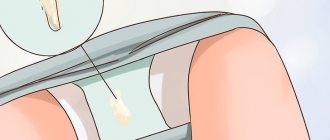In addition to discomfort and swelling of the labia, this disease may indicate both a dysfunction and the presence of a serious disease of the female reproductive system.
What are the causes of itching in the vagina and vulva?
Causes of vaginal itching:
- chlamydia;
- ureaplasmosis;
- trichomoniasis;
- donovanosis, or inguinal granuloma;
- gonorrhea;
- mycoplasmosis;
- genital herpes;
- genital warts;
Vaginal itching may also occur:
- against the background of severe stress;
- against the background of hormonal disorders
- against the background of mental disorders,
- as well as other diseases of the body (diabetes mellitus, endocrine diseases, liver diseases).
After an infection enters the vagina, a protective reaction of the body occurs - inflammation. The inflammatory process of the internal or external genital organs signals a disruption in the normal functioning of the female reproductive system and may be accompanied by strong discharge of various types from the vagina .
What to do if you are bothered by itching of the external genitalia?
If you feel a burning sensation in the genitals, discomfort and painful urination. If a rash or swelling appears on the labia majora or minora, this is a reason to consult a gynecologist. A medical gynecologist will diagnose the body, make a diagnosis and select the most suitable treatment for you.
Vagina after intercourse
The vagina is a delicate organ, lined with a thin mucous membrane, which, despite its wide flexibility and evolutionary adaptation to sexual activity, can feel the effects of the mechanical actions that constitute the essence of sexual intercourse. Increased friction, especially if there is insufficient lubrication, can cause general vaginal irritation after intercourse.
What does the vagina look like after intercourse? It is not uncommon for the vagina to become swollen or red after sexual intercourse. It can also be painful for many reasons, such as stretching, bleeding or staining.
Before visiting a gynecologist
- 2 days before your visit to the doctor, do not light candles or use sprays to relieve symptoms.
- Abstain from any sex for 2 days
- Avoid using antibiotics for at least a week
- Do not douche or use intimate hygiene products 2 days before going to the gynecologist
- The evening before your visit (which will be the next day), wash your genitals with baby or regular soap and warm water.
- You need to urinate 2-3 hours before visiting the doctor
The gynecologist first conducts a survey. You should tell him directly about unprotected sexual intercourse, the number of sexual partners and other important points that are not necessarily related to coitus. The doctor does an examination. Almost always, a cervical smear is taken for flora, as well as a bacterial culture for aerobic, anaerobic flora and fungi (plus an antibiogram to find out which drug is best to destroy the causative agent of the disease).
The patient is also referred by the attending physician for PCR diagnostics, RIF and ELISA to detect sexually transmitted diseases, if any. In some cases, the doctor also advises checking for intestinal dysbiosis and the presence of worms. Do not refuse the prescribed examinations, because a chairside examination alone will not help identify your diseases.
Swollen vagina after intercourse
A swollen vagina after sexual intercourse is most often the result of the laws of physics, including the force of friction that destroys fragile surfaces. Swelling is the result of hyperemia of the mucous membrane. In special cases, bleeding from the mucous membrane may occur in this situation. Irritation and abrasions are especially favorable due to the lack of proper vaginal lubrication . Lubricants should be used when a woman's body does not produce enough secretions, even when she is aroused and feels excessively dry there. The best solution is intimate gels available at the pharmacy, which significantly reduce friction. Remember that proper hydration will significantly minimize the risk of any mechanical injury.
About
Possible diseases
A burning sensation in the labia area sometimes indicates diseases of the female reproductive system. It stings the perineum due to the development of sexually transmitted or infectious diseases.
Candidiasis
One of the reasons for the appearance of burning of the labia majora of the vagina. The disease develops due to the penetration of fungi into the body, which, when multiplying, cause irritation and itching. You can suspect candidiasis by the characteristic discharge in the form of curdled flakes.
Genital herpes
The disease is caused by the herpes virus and is transmitted during sexual contact. It is characterized by the formation of a large number of small bubbles with liquid contents. As the blisters mature, they burst and ulcers appear in their place. They cause a burning sensation on the large lips. It stings especially during hygiene procedures, when soap or shampoo gets on the sores and irritates them.
With genital herpes, the genitals are always hot, red, and inflamed. Severe irritation leads the woman to scratch her perineum. Because of this, the ulcers enlarge and ooze blood. Pain is added to the symptoms. Gradually, purulent discharge appears from the vaginal area, body temperature rises, and the inguinal lymph nodes enlarge.
Colpitis
The feeling of pinching in the intimate area may occur due to colpitis. This disease occurs as a result of mechanical damage or poor vaginal hygiene.
The burning sensation is accompanied by pain in the groin area, bleeding from the vagina, not associated with menstruation.
Diabetes
Constantly elevated blood sugar leads to dehydration. First, the mucous membranes suffer, and over time, the skin throughout the body becomes dry and flaky. In the perineal area, dryness of the vaginal mucosa and the skin of the outer lips is also observed. They peel, crack, and ulcers appear on them. Also, with diabetes, there is a large amount of sugar and ketones in the urine, so after each urination, irritation, itching and burning of the labia majora intensify.
Bacterial vaginosis
This gynecological disease often causes tingling of the skin. Additional signs are whitish or grayish vaginal discharge.
Bartholinitis
Blockage and inflammation of the Bartholin gland, which is caused by gonococci and staphylococci. The disease causes burning and itching in the reproductive organs.
Gardnerellosis
Infectious pathology transmitted through sexual contact. The main symptoms are burning in the labia minora and majora, redness of the skin in the perineum, pain in the lower abdomen.
STD
Diseases transmitted through sexual contact contribute to the appearance of itching, irritation, and burning of the genitals. They are caused by Trichomonas, gonococci, and chlamydia. In this case, vaginal discharge, an unpleasant odor from the reproductive organs and plaque on the labia majora of the vagina appear. In some cases, a rash appears.
Woman's vagina after intercourse and latex allergy
After sexual intercourse, a woman's vagina often becomes swollen and irritated for other reasons, one of which is an allergic reaction. If partners used condoms during lovemaking, it is possible that redness, burning, itching, or even soreness are the result of an allergy to latex , which is the material from which condoms are typically made. This is a relatively common situation, as protection manufacturers are also aware that they are introducing condoms made of a different material to people who are allergic to that material.
Another cause of an allergic reaction may be an allergy to cosmetics that your partner used when bathing before sexual intercourse . Spermicide, used as protection against unwanted pregnancy, can also be a strong irritant. Sometimes there is also an allergy a lubricant - then you should replace it with another.
Prevention
You can prevent the appearance of a burning sensation in the labia area if you follow a number of preventive measures:
- Using hypoallergenic intimate hygiene products.
- Wearing loose underwear made from natural materials.
- Regular care of the intimate area. This will help prevent the accumulation of pathogenic bacteria that provoke the development of diseases of the reproductive system.
- After using an epilator or razor, treat damaged skin with wound-healing agents.
What diseases does soreness in the vagina after intercourse mean?
Pain in the vagina after sexual intercourse, in a situation where discomfort appears after a few days and lasts a long time, is most likely a symptom of an infection that develops as a result of sexual intercourse.
One of the diseases that causes pain in the vagina is infection with E-coli bacilli. Additionally, this discomfort may be a sign of candidiasis or vaginal mycosis. In some cases, this condition indicates a sexually transmitted disease , but usually, in addition to vaginal pain, symptoms such as:
- lower abdominal pain
- burning urethra
- discomfort in other organs.
In such a situation, it is extremely important to consult a doctor and apply appropriate therapeutic therapy. You can take advantage of a consultation at the Dimedic online clinic. This allows you to conduct a medical consultation without leaving your home. The specialist conducts a detailed interview with the patient and individually selects treatment according to his needs. The online clinic allows you to renew your prescription for chronic medications, such as birth control. It also helps in the treatment of, for example, menopause, sexually transmitted diseases, potency disorders or premature ejaculation. In a convenient and discreet way, you will get your medicine or prescription home for self-administration.
About
Treatment
Whether treatment is needed or not depends on the cause of the symptom. If it is caused by an allergy to hygiene products, synthetic or tight underwear, pads with fragrances, then the provoking factor should be eliminated. If, a few weeks after giving up these items, the symptoms remain, then the cause must be looked for in diseases, for this you need to contact a gynecologist.
After conducting an examination with a speculum and taking swabs from the vagina and urethra, the doctor will be able to identify the possible cause of discomfort. After this, he will prescribe the necessary treatment or refer you to the appropriate specialist (endocrinologist, urologist, dermatologist).
If the disease is caused by an infection, treatment with antibacterial agents in the form of ointments, suppositories, creams and tablets will be required. Candidiasis is treated with antifungal medications. If diabetes mellitus is detected, hypoglycemic agents are prescribed.
Vagina after first intercourse
The vagina may bleed and hurt after the first sexual intercourse. This is due not only to prolonged friction, but also to defloration, that is, violation of the hymen. Fortunately, in general - especially if the hymen is crescent-shaped - there is little to no pain. A separate problem is injuries resulting from the inexperience of the woman, and often her partner. A little skill in the art of lovemaking increases the risk of feeling vaginal dryness after intercourse, purely mechanical injuries as a result of not very gentle penetration, lack of sensation of lubrication and similar reasons.
Vorobyova Marina
Neurologist of the highest qualification category (work experience 14 years), doctor of neurofunctional diagnostics (work experience 12 years); author of scientific publications on vertebroneurology; participant of scientific conferences on neurology and functional diagnostics of all-Russian and international significance.
How to get rid of burning sensation in the vagina
To get rid of this unpleasant symptom, first eliminate possible external factors. They are described in detail above. If after 3 days the itching and burning have not gone away, then you need to go to the doctor, because the cause can be very serious. It is especially important to visit a gynecologist and get all tests done after you have had sex with someone without barrier contraception.
You need to know that sexually transmitted diseases behave cunningly. They may not appear immediately. From the moment of infection to the appearance of the first symptoms, it can take several days, 2-3 weeks, several months or even a year. If diseases of the genital area occur in a chronic form, the burning sensation of a woman’s vagina becomes stronger during menstruation and on the day of ovulation.
Treatment of diseases transmitted through unprotected sex is carried out only after an accurate identification of the pathogen. And this can only be found out by passing the tests prescribed by the gynecologist. Treatment for STDs can be carried out:
- antibacterial drugs
- immunostimulants and immunomodulators
- medications to normalize the natural flora of the vagina and intestines
- physiotherapeutic methods
- taking vitamins
Be attentive to yourself, this is the key to good health!











